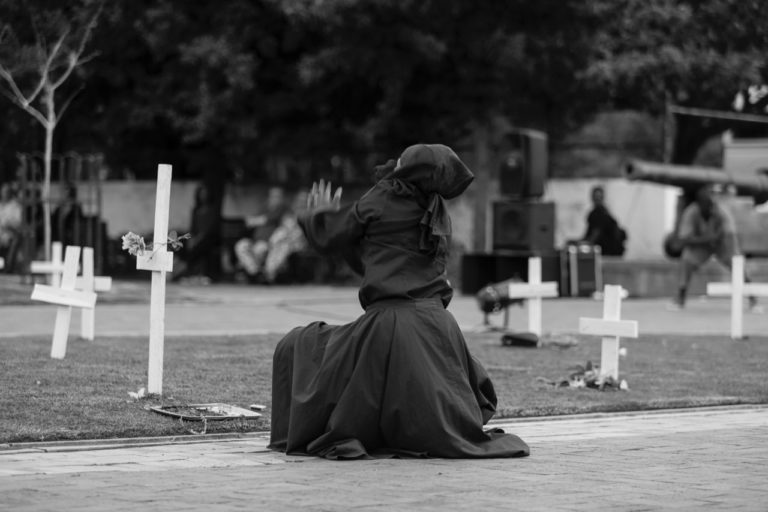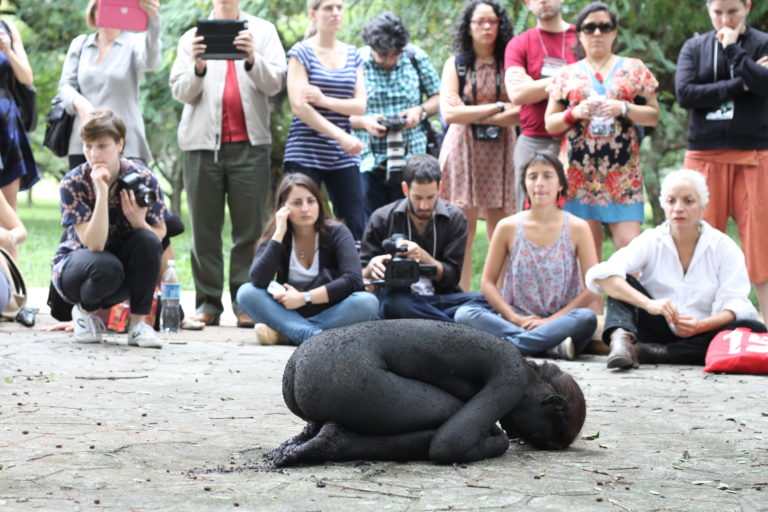Response to Jodi Melamed, “Proceduralism, Predisposing, Poesis: Forms of Institutionality, In the Making,” published in Lateral 5.1. Tabares invites us to question the role of what he calls ‘para-institutions,’ such as corporations, in shaping and influencing the logics and investments within the university. As a counterpoint to these processes, he ponders the possibilities of seizing upon the elements of proceduralism in mobilizing forms of collectivity that can span across institutional contexts outside the academy.
Issues
Neoliberalism, Racial Capitalism, and Liberal Democracy: Challenging an Emergent Critical Analytic
Response to Jodi Melamed, “Proceduralism, Predisposing, Poesis: Forms of Institutionality, In the Making,” published in Lateral 5.1. Aho pointedly argues that studies of institutionality all too often substantiate what she calls neoliberalocentrism, which readily posits neoliberalism as the singular paradigm into narrating a teleological development of history. Instead, she echoes Kim and Schalk to articulate ‘crip-of-color materialism’ as an analytic that thickens understandings about global structures of inequity and fissures within them.
Response to Tanja Aho and Leland Tabares: Madness and Parainstitutionality
Tanja Aho’s response both criticizes a scholarly trend she identifies as “neoliberalcentrist analytics” for presuming neoliberalism’s homogeny, hegemony, and totality and introduces a new critical analytic, “crip of color materialism,” which Aho describes as “the convergence of a historical materialist critical disability studies/crip theory/mad studies with critical race theory and queer of color critique.” This…
Review of Hegemony, Mass Media, and Cultural Studies: Properties of Meaning, Power, and Value in Cultural Production by Sean Johnson Andrews (Rowman & Littlefield)
Sean Johnson Andrews has produced an engaging text of multifaceted value. His work, particularly the opening chapters, provides a concise history of the Birmingham Centre for Contemporary Cultural Studies (CCCS), the (early) Frankfurt School Critical Theory, and the Political Economy of Communication (PEC). Although the histories and notable figureheads of these schools will be broadly familiar to most scholars working in the realm of cultural studies, these opening chapters would be an excellent introduction to the field for either a general readership or students. Indeed, this would make a good textbook in many contexts.
Review of Speculative Blackness: The Future of Race in Science Fiction by André M. Carrington (University of Minnesota Press)
André Carrington’s ‘Speculative Blackness’ is a novel approach to the consumption of race representation in media. Carrington explores how Blackness is manufactured, consumed, and transformed through the speculative fiction genre across multiple 20th and 21st century mediums. Traditional media of comic books and television shows reveal the marginalized status of Black figures however, these media do not exist in a vacuum. The consumption of speculative fiction is a transformative process for the original content, which consequentially produces amateur media due to a long-established history of fan interaction. Black representation is characterized as the exception, not the rule, in traditional production, but fan consumption reconfigures these notions. Ultimately, Carrington’s work is an innovative dialogue regarding a genre that creates worlds speculating on what could be. Speculative fiction breaks down preexisting notions of our reality and creates worlds with entirely new expectations and interactions. With the creative liberty of the genre, Carrington casts Black representation as a consumed media but also an imaginative effort.
Review of Dispossession: The Performative in the Political by Judith Butler and Athena Athanasiou (Polity)
“Dispossession: The Performative in the Political” is an interdisciplinary cultural text published from the conversations between Judith Butler and Athena Athanasiou. “Dispossession” brings the reader to key questions within philosophical inquiry including: What does it mean to be human? Which bodies are vulnerable as a result of normalizing regimes? How does precarity shift over time? What does occupation mean in regards to discipline and resistance? Which bodies are allowed to have a place and what does demanding a place do to dislocated bodies? Can non-normative people be recognized by the state without incorporation to propriety politics? How is agency complicated by the inter-related nature of life in the everyday?
Review of After Art by David Joselit (Princeton)
David Joselit’s slim volume “After Art” offers multiple intriguing frameworks to analyze art in the present-day globalized art world. After Art backs away from the traditional approach of artist intent and production and looks at what happens to images once they are attached to the networks that circulate them. Instead of proselytizing individual or even original artworks, Joselit champions images that are constantly reproduced and remediated by artists and architects such as Tania Bruguera, Ai Weiwei, Sherrie Levine, Matthew Barney, Le Corbusier, and Rem Koolhaus.
Review of Critical Marxism in Mexico: Adolfo Sánchez Vázquez and Bolivar Echeverría by Stefan Gandler (Haymarket)
With this book, Stefan Gandler has made important contributions to the study of Marxism and critical social theory in Mexico. Regarding the first contribution, this book expands the theoretical tools and insights within the canon of Marxist thought. It does this by exposing American and European Marxists to two very important thinkers who have not yet been given much attention by Marxists outside of the Latin American context. The second contribution lies in Gandler’s exegetical work on the texts of these two thinkers, Adolfo Sánchez Vázquez and Bolívar Echeverría.
Review of Portfolio Society: On the Capitalist Mode of Prediction by Ivan Ascher (MIT Press)
As Ivan Ascher shows in his book “Portfolio Society,” since the mid-twentieth century capitalism’s developed world has found itself increasingly dependent on a system of money in itself as determinant of value—a system of credit and debt, of perceived risks and predictions.
Introduction
This special issue explores how best to use performance to leverage justice for victims of trafficking, child soldiers, illegal immigrants, the poor, and others who lack recognition and protection within the legal and social apparati of national governments and some non-governmental organizations (NGOs). This focus has emerged from a two-year research project on “Gendered Citizenship: Manifestations and Performance” between scholars in theatre and performance in collaboration with politics colleagues at University of Warwick, UK and Jawaharlal Nehru University, Delhi.
Sing For Your Supper: Pauperism, Performance, and Survival
Come what may the house enables us to say: I will be an inhabitant of the world, in spite of the world.1 This essay presents a piece of performance research that brought together a theatre-maker/performer and a theatre researcher to explore the relationships between theatre and poverty. Our collaboration was just one part of a broader research project,…
“A Day for Us to Mourn”: Unsettling Performances of Marikana
Introduction On the 16th of August 2012 thirty-four Lonmin miners lost their lives at Marikana in South Africa. They were killed by the police who—after failed, ignored, or impeded negotiations with the striking miners—were assigned by the Lonmin Board of Directors and the mining unions to demobilize and dismantle the striking mass present at the…
The Maid Vanishes
This essay begins with two brief accounts—one of arrival and the other of vanishing. It was the late summer of 2005 when we—my partner, young daughter, and I—moved to the UK, where I was to take up a lectureship at the School of Theatre, Performance and Cultural Policy Studies at the University of Warwick. I…
Circuits of Invisibility: Performance, Violence, and Sexuality
The body is a repository of metaphors and within its function of global exchange, its limits of fragility and destruction, the body serves as a way of dramatizing the social text. Olivier Mongin, in his important study on film and modernity, has said that there is currently an “economía de las imágenes de violencia… [en…
Death on the US-Mexico Border: Performance, Immigration Politics, and José Casas’s 14
Jimmy Noriega looks to theatrical performance as a method for engaging the subject of “illegal” immigration and, in particular, the death of undocumented migrants. He argues that theatre can provide an avenue by which to generate both a private and public discourse that allows for a more nuanced and fair treatment of migrant death, which is especially significant in comparison to the representations offered by the typical media coverage. Rather than focus on several texts, this essay analyzes one play—14 by José Casas (2003)—and the ways it engages with mass migrant death and the myriad of responses to it.








